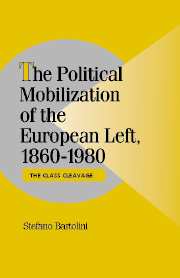Book contents
- Frontmatter
- Contents
- List of Figures and Tables
- Dedication
- Acknowledgments
- Introduction
- 1 THE CLASS CLEAVAGE: CONCEPTUAL AND METHODOLOGICAL FRAMEWORK
- 2 THE EUROPEAN LEFT: SIZE, IDEOLOGICAL ORIENTATION, AND ORGANIZATIONAL COHESION
- 3 INDUSTRIALIZATION, URBANIZATION, AND LABOR'S RESPONSE
- 4 CULTURAL HETEROGENEITY
- 5 ENFRANCHISEMENT
- 6 ORGANIZATIONAL STRUCTURING AND MEMBERSHIP MOBILIZATION
- 7 POLITICAL INTEGRATION
- 8 CLEAVAGE STRUCTURES
- 9 THE COMMUNIST SPLIT: UNITED AND DIVIDED LEFTS
- 10 THE MACROCONSTELLATION OF CLASS CLEAVAGE STRUCTURING
- DATA APPENDIX
- References
- Index
- CAMBRIDGE STUDIES IN COMPARATIVE POLITICS
3 - INDUSTRIALIZATION, URBANIZATION, AND LABOR'S RESPONSE
Published online by Cambridge University Press: 20 October 2009
- Frontmatter
- Contents
- List of Figures and Tables
- Dedication
- Acknowledgments
- Introduction
- 1 THE CLASS CLEAVAGE: CONCEPTUAL AND METHODOLOGICAL FRAMEWORK
- 2 THE EUROPEAN LEFT: SIZE, IDEOLOGICAL ORIENTATION, AND ORGANIZATIONAL COHESION
- 3 INDUSTRIALIZATION, URBANIZATION, AND LABOR'S RESPONSE
- 4 CULTURAL HETEROGENEITY
- 5 ENFRANCHISEMENT
- 6 ORGANIZATIONAL STRUCTURING AND MEMBERSHIP MOBILIZATION
- 7 POLITICAL INTEGRATION
- 8 CLEAVAGE STRUCTURES
- 9 THE COMMUNIST SPLIT: UNITED AND DIVIDED LEFTS
- 10 THE MACROCONSTELLATION OF CLASS CLEAVAGE STRUCTURING
- DATA APPENDIX
- References
- Index
- CAMBRIDGE STUDIES IN COMPARATIVE POLITICS
Summary
Industrialization and urbanization are regarded as preconditions of working-class political mobilization. These processes create and intensify the social problems and grievances of the working classes and lower classes in general; at the same time, they constitute the structural preconditions for these problems to become sources of organization and mobilization efforts. The resulting social mobilization gives rise to new social groups; it increases the self-awareness of those already existing; and it intensifies existing conflicts and provokes the explosion of latent ones. Linking social mobilization processes with the left's electoral mobilization postulates the following underlying causal chain: that the formation of the working class – in the sense of the creation and spread of given class conditions – impinges directly on the development of class consciousness, which in turn leads to the structuring of the class cleavage. According to this hypothesis, cross-country variance is to be explained by differences in the available proportion of potentially mobilizing voters, the latter in turn resulting from the quantitative spread and qualitative consequences of the formation of working-class conditions. This general hypothesis is the subject of this chapter.
CONCEPTUAL FRAMEWORK
The belief in a relationship between industrialization, working-class formation, and the political response of labor is common to both historical socialist thinking and more recent post–World War II literature. However, the emphasis on what this means is different. The relationship dominated the nineteenth-century debate on the “social question” and was at the heart of the theorizing of socialist thinkers. Marx's analysis of the social consequences of industrialization implied the formation of a new type of worker in large, machine-intensive manufacturing, which he characterized as socially homogeneous, functionally interchangeable, and economically alienated, that is, “abstract labor” potential.
- Type
- Chapter
- Information
- The Political Mobilization of the European Left, 1860–1980The Class Cleavage, pp. 122 - 179Publisher: Cambridge University PressPrint publication year: 2000



